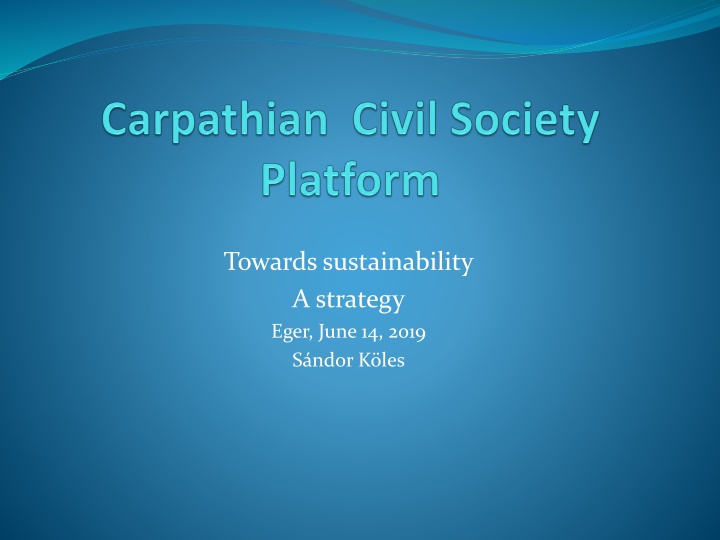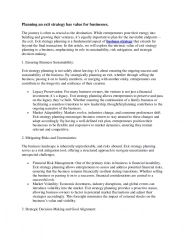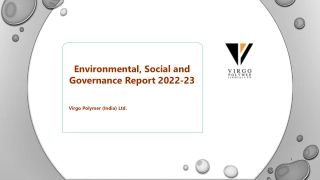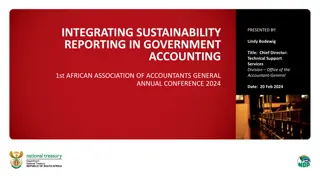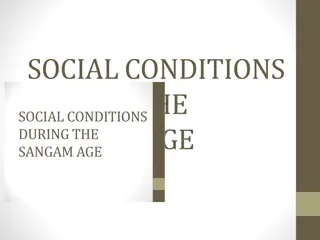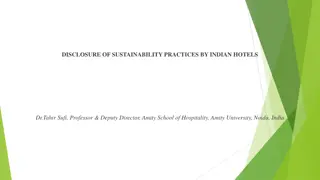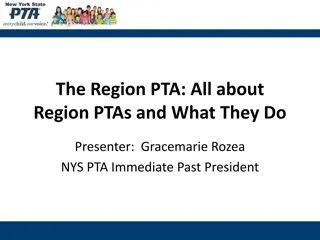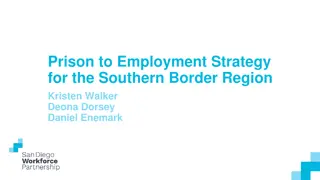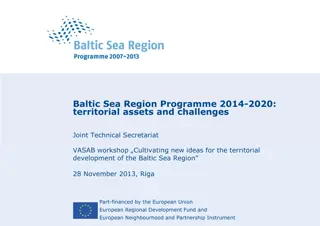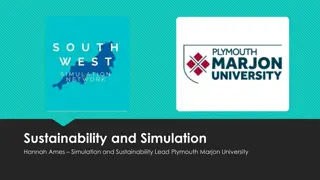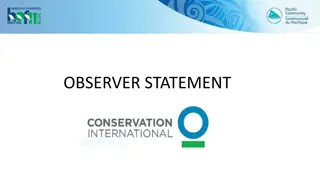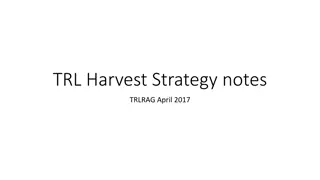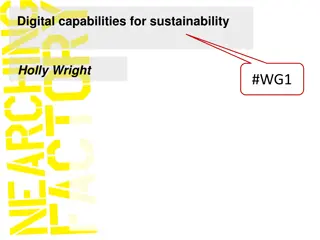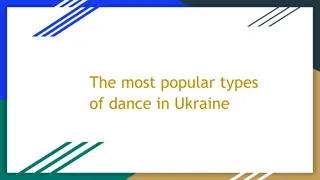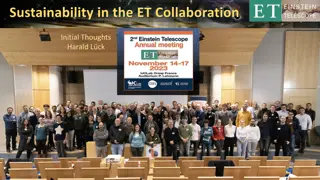Towards Sustainability Strategy in Carpathian Region
The creation of a Platform to strengthen civil society in the Carpathian Region, fostering cooperation among CSOs working with grassroots organizations and vulnerable groups. Goals include coordinating efforts, amplifying impact, and generating innovative solutions to socio-economic issues. The Platform serves as an inter-regional network focused on common ground for cooperation, combining nature, history, cultural heritage, and shared challenges. Main challenges faced by societies in the region include social disparities, political tensions, migration, and lack of accountability, leading to disengagement and growing extremism.
Download Presentation

Please find below an Image/Link to download the presentation.
The content on the website is provided AS IS for your information and personal use only. It may not be sold, licensed, or shared on other websites without obtaining consent from the author.If you encounter any issues during the download, it is possible that the publisher has removed the file from their server.
You are allowed to download the files provided on this website for personal or commercial use, subject to the condition that they are used lawfully. All files are the property of their respective owners.
The content on the website is provided AS IS for your information and personal use only. It may not be sold, licensed, or shared on other websites without obtaining consent from the author.
E N D
Presentation Transcript
Towards sustainability A strategy Eger, June 14, 2019 S ndor K les
The vision The creation of the Platform (Hub) is driven by that common vision to strengthen vibrant, pluralistic, and rights-based civil society in the territory of the Carpathian Region It is an instrument to realize this mission by offering a framework for cooperation between those civil society organizations (CSOs), which are working primarily with grassroots organizations and with vulnerable groups.
Goals To coordinate and synergize single and often isolated efforts of CSOs To amplify the effect of their activity at local, regional and inter-regional levels To generateand disseminate innovative solutions for resolving socio-economic problems in order to serve better their constituencies and articulate the needs of silent communities.
Common Place Common Ground The Platform is an inter-regional place-based network attached to the geographically, historically, culturally and sociologically contiguous territory of the Carpathians, which is the common ground for cooperation.
Connecting elements Nature : the Carpathian mountains and of its river valleys Common history and common historical experiences Rich and diverse commoncultural heritage Common peripheral location because of the border situation Common socio-economic challenges Existing elements of common identity ( Homo Carpathicus )
Main challenges societies are facing increasing of social and regional disparities; growing gaps between regions within a country, rising social and ethnic tensions; migration increasing omnipotence of state, weakening local competencies and autonomies The weakening of rule of law, the democratic institutions, and the endangered independence of media; lack of governments accountability and transparency, and rising corruption ( crony capitalism ); low level of citizens engagement, high passivity, apathy; lack of social solidarity; increasing Euroscepticism, isolationism and growing extremism increasing mistrust in state institutions, political parties and between citizens ( the mistrust we trust ); increasing governmental intolerance towards social autonomies, citizen initiatives, and intimidation of civil society.
Challenges in regional context These challenges are even more powerful in such remote/peripheral areas like the Carpathians, and it have its effect on the civil society and on those organizations, which represents civil society. CSOsare in disadvantage compared to the situation of organizations seated in the capital cities, although the demands for their effective work can be considered higher in such remote and peripheral, mainly rural areas like border regions.
Common external and internal challenges of CSOs as it was identified during the process
Unfavorable or even hostile socio-political environment Controversial governmental decisions show political indifference and neglect towards civil society stigmatization of civil society organizations, as foreign agent (Hungary) party political dependence of CSOs; favoritism, only those selected CSOs haveaccess to resources, which are close to the government; advantages of government-conform CSOs the weakening of competencies of local authorities; increasing dependence of local governments from central authorities, which results in the emptying of local democracy; there is no cooperation between CSOs and local governments extremely quickly changing legislation, complicated and bureaucratic regulations; little assistance to help to adhere to new conditions
Challenging social environment peoples indifference towards public affairs; lack of motivation, apathy; target group is closed, hard to involve and activate them increasing social exclusion, especially in the case of Roma, poor, and people with disability, etc. emigration of innovative young people (they vote by foot) hate speech is an everyday thing
Financing CSOs lack of domestic and independent funds, narrowing funds, financing opportunities; increasing competition for funding resources EU Structural Fund sources dried up (no new open call for NGOs) but, at the same time, weak absorption capacity of NGOs lack of local philanthropy; there is no effective incentive scheme for giving lack of small grants scheme, e.g. lack of funds for start-up initiatives Donor driven programs; requirements of some donors confront the goals of NGOs and their members; they promote topics which are artificial and not important for the society; donors priorities do not match the priorities of the NGOs shrinking income generation possibilities; NGOs are cut out providing services lack of stable income reduces effectiveness of personnel work. Instable financing of NGOs (it s not about financial sustainability but about irregular financing lack of financial and technical support available for citizens mobilization .
Internal organizational challenges lack of cooperation among civil society organizations; there are no cooperating networks and there is no information flow between organizations the importance of credibility, visibility, and transparency is not recognized and addressed by NGOs sufficiently or, if it recognized, there is no skill, capacity, and knowledge how can it be promoted and improved (legitimacy) insufficient presence of NGOs and their activities in media; low PR capacity of the organizations; poor communication skills lack of strategic thinking, planning and organizational development lack of partnerships with the foreign NGOs working in the same fields (most of cross-border projects are implemented by the organizations specializing on cross-border cooperation but not on vulnerable groups) lack of volunteers; narrowing possibilities to support volunteers professionally/financially; lack of knowledge on how to involve volunteers and work with them; lack of entrepreneurial and management competencies shortcomings of human resources within NGOs ; burn off existing team, lack of leadership, no career path inside NGOs.
Function, possible roles and services of the Platform defined by CSOs participated in the process
Core values for joint actions shared by Carpathian CSOs Social and regional solidarity Ensuring equal opportunities, Social justice and social inclusion Respect of the rich natural, cultural and ethnic diversity of the Carpathians
Guiding principles of the Platform The Platform offers an organized framework for civil society actors in order to complement each other's activity, that enabling them to increase their social impact and strengthen their social innovation capability. Beyond the broad mission, the Platform and Hub shares a set of the following guiding principles
Complementarity: build on what already exist By leveraging existing human, technical, and technological resources of CSOs within the Carpathians via mutually beneficial cooperation Supporting existing and emerging local civil society, community, and citizens led activities and inspire social innovation.
Support grassroots and local actors By directing its support to organizations and actors who are embedded within the communities they serve. This entails a broadly inclusive definition of civil society as an arena, distinct from the state, the market, and the individual household, created by individuals, groups, and organizations acting together to promote social justice, democracy and eventually common interests in pursuit of social good. This includes, for example, community leaders, civic activists, networks, social movements, media, and others beyond traditionally organized civil society and places an emphasis on providing opportunities to the most marginalized groups locally and inter-regionally.
Guiding principles Flexibility: adapt and respond to changing conditions aiming to respond rapidly to changing conditions and emerging needs and seeks to be flexible and agile to support nascent civil society needs and address new challenges as they arise. Social innovation and mutual learning by facilitating innovation within civil society by supporting civil society to participate in developing new or adapted ways of addressing common challenges. To help driving this, the Platform supports learning across civil society. This focus on innovation of approaches and methodologies will be one of the many means through which the Platform offers unique, timely, and demand driven services that stand apart from other ongoing initiatives. Ensure ownership of participating CSOs - as the Platform is driven and owned by civil society, the Platform and those they serve will work in a participatory fashion.
Roles and services The Platform pursues its mission, in line with the guiding principles, by fulfilling four key roles: facilitator and convener matchmaker and broker innovator advisor and counselorand advocator. . These roles should respond to the key challenges CSOs facing in the Carpathians.
As a facilitator and convener It partners to encourage knowledge exchange and collaboration by bringing multiple civil society actors together. This may happen through structured events or channels such as organizing conferences, workshops or organically through the provision of a shared workspace to host multiple CSOs. Depending on regional needs, temporary popup hubs (thematic working groups) may be established in response to a pressing issue or emerging need Hublets (local platforms) may be created in localities that require greater proximity to services. As a convener, the Platform may also bring civil society together with other civil society networks, private sector, media, academia or government actors.
As a matchmaker and broker connects individual CSOs or activists that have specific needs with actors that have the expertise, resources, and capacity to support them. This role focuses on creating bi- or multilateral linkages locally and across borders. This may occur through various means: secondmentor fellowship programs to promote crosspollination of ideas and skills between organizations recruitment of peer ambassadors (facilitators, coaches) who have the skills and expertise to advise other organizations or recommendations of third party capacity building programs, trainings, mentorships, coaching, toolkits, or case studies.
As an innovator It partners with civil society, private sector, academia, and other stakeholders to seek and stimulate new approaches and techniques, and provide a venue, either physical or digital, to receive peer review on and test new approaches to challenges and opportunities. It may accomplish this role through working and partnering with non-traditional actors, like innovative start ups, etc.
As an advisor and counselor It partners to provide some amount of information and expertise directly to CSOs in the region, in addition to connecting them with other resources Provides expertise on innovative tools, technologies, approaches and participatory methods Other services may include sharing relevant research, policy papers, etc. with an interested CSO, providing capacity building trainings directly, or advising on emerging issues
As an advocator Enhances the voice of the Carpathians at local, regional, national and European level Influences on and initiates topics for policy agendas Prepare policy recommendations
Roles and services/activities organizing conferences and workshops on common topics at sub-regional and interregional levels organizing exchange programs and study trips organizing forums with government, private sector, and others discussing policy issues create virtual knowledge exchange platform through the virtual hub establish popup hubs (temporary and/or permanent working groups) on cross-cutting and around emerging issues) create sub-regional hublets/local platforms shared workspaces (especially serving small/growing CSOs) Facilitator & convener to encourage knowledge exchange
Matchmaker & broker to pair resources with needs seeking for partnerships for projects with CSOs at local, regional and international level seeking for partnership with donor organizations connecting media actors with CSOs connecting business, esp., start ups with CSOs crowd sourcing platforms to help CSOs access funding offer secondmentand providing internship opportunities
Role and services/activities prize for social innovation and best practice awards sharing and disseminate good practices and innovative solutions digital trainings (long distance learning and communication) providing expertise in specific issues based on needs supporting cooperative pilot projects Innovator to initiate new approach and solutions
Role and services/activities Advisor & counselor to provide information and expertise Capacity building and training on issues identified by CSOs, expert advice on legal enabling environment for civil society and other legal, financial, technology, or other matters guidance for planning and communication
Role and services/activities promote the Carpathians at national and international (European) level influence on and initiate the topics for policy agendas Advocator to enhance Carpathian s voice
Organization There is no hierarchy in this envisioned organizational structure. The organizational cohesion is ensured by the gravity of the complementarity (see, guiding principles) and interdependency, which is based on a similar situation, shared values, common goals and mutual trust.
Building blocks of the organizational structure Hublets (or local platform), which are the sub-regional network of CSOs, that have been created during the process in Hungary, Poland, Slovakia, and Ukraine. They are the territorial leg and as such is the horizontal component of the inter-regional) Platform. They are the ground of the inter-regional Carpathian Platform. Each Hublet (local Platform) developed its own strategic directions reflecting on the characteristics and main challenges of the given Carpathian sub-region. They meet regularly and organize their own activities. They can decide to extend the network or not and set up rules who can be the member of the local network
Building block Popup Hubs (thematic working groups), which have been created during this meeting. The popup hubs (thematic working groups) bring cross-cutting, inter-regionally relevant issues into the Platform and, as such, they are the vertical component of the Platform. The popup hubs (thematic working groups) have their own work plan and elect spoke persons who represent the group. The popup hubs are flexible, anybody can initiate within the network
Building block The Carpathian Platform as an inter-regional assembly and forum of CSOs is an umbrella organization. It holds its meeting once a year and discusses topical issues, suggestions, adopts and disseminate policy papers related to the state of the civil society in the Carpathians. It serves as a face-to- face meeting point for CSOs; partnership building; meetings with governmental actors; direct exchange, etc. The Carpathian Platform would be a membership organization and governed by its Council appointed by the members of the network, etc.
Building block Virtual Hub is a complementary instrument of the human aspect of the Platform and serves the members of the network as a communication tool and knowledge pool.
Sustainability Depends on three closely related factors and three legs
Sustainabilty ownership: the members of the Platform should feel that the content, strategy and the activities of the Platform are defined and formulated by themselves, and they have tangible experiences of the added values of a cooperating network by recognizing the advantages of mutually beneficial cooperation that enhances the impact of their own efforts.
Sustainabilty complementarity: how the Platform fulfills its functions and services in the line with one of the main guiding principles, which is the complementarity, that means how and in which extent the network members able to live with the opportunity given by a cooperating network and how they are capable to leverage, complement, and to share with each other their human, intellectual, technical and physical resources
Sustainability securing funds for the operation: how the Platform will be able to secure the financial background for its services to network members, to coordinate the activities and make visible the Platform at inter- regional and European level in order to play its role to bringing closer CSOs needs to donors
Three legs 1. leverage existing internal resources Examples: offer technical assistance (from better established NGOs to grassroots) sharing of technical capacities (for example, to host the website of smaller CSOs) sharing of office place with start- up CSOs free services to each other (for example, accountancy ) providing consultancy on planning, advocacy, fundraising strategy, etc. sharing of costs of events and actions exchange of materials, strategies, methodologies voluntarism etc.
Three legs 2. mobilize resources Examples: Develop joint bi- or multilateral project proposals around topics identified by partners within the Platform identify fundings for thematic groups created during this Platform meeting and future thematic groups (pop-up hubs) learn new techniques for resource mobilization increase the absorption capacity of CSO (project generation) involvement of businesses (CSR) identify institutional donors (local governments, governments, EU funds) income generation through services community enterprises
Three legs 3. Securing funds for the services of the Platform maintenance of the Virtual Hub (the online platform), which is the communication instrument of the Platform costs of annual meetings of the Platform creation of a grant funds for innovative mini grant providing technical assistance to its members (capacity building trainings, consultation, etc.) promotion of the Carpathians and the Platform
